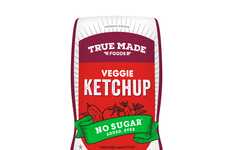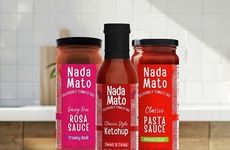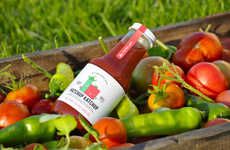
This Artisan Ketchup is Made from Roasted New Jersey Tomatoes
Rebecca Byers — July 17, 2015 — Lifestyle
References: food52
Made in Princeton, New Jersey, this artisan ketchup is an upleveled take on what is arguably the most popular condiment. Especially useful if cooking with ketchup, First Field's roasted tomato ketchup contains no tomato paste or concentrate. The simple recipe includes fresh New Jersey tomatoes, poblano peppers, onions, garlic and a hint of molasses.
Sold in a three-pack, the First Field offering is impressive in its all-natural formula, which lends itself well to cooking, as artificial flavoring can certainly alter the flavor of the recipe overall.
This upleveled take on a classic condiment speaks to the artisan movement and the concerns of the modern consumer in regards to the quality and origin of the food they eat.
Sold in a three-pack, the First Field offering is impressive in its all-natural formula, which lends itself well to cooking, as artificial flavoring can certainly alter the flavor of the recipe overall.
This upleveled take on a classic condiment speaks to the artisan movement and the concerns of the modern consumer in regards to the quality and origin of the food they eat.
Trend Themes
1. Artisan Condiments - The rise in demand for artisan condiments presents an opportunity for innovative ketchup makers to create unique and high-quality products, such as roasted tomato ketchup.
2. Clean Label Ingredients - Consumers looking for all-natural and clean label products are driving the need for ketchup made from fresh and locally-sourced ingredients, creating potential for disruption in the condiment industry.
3. Gourmet Home Cooking - The trend towards gourmet and homemade cooking experiences opens the door for specialty condiments like roasted tomato ketchups that elevate everyday recipes.
Industry Implications
1. Condiment - The condiment industry can capitalize on the demand for unique and high-quality products by offering a variety of artisan ketchups made from roasted tomatoes.
2. Food Manufacturing - Food manufacturers can take advantage of the clean label movement by producing ketchups using fresh, locally-sourced ingredients without artificial flavoring or additives.
3. Foodservice - Restaurants and foodservice providers can tap into the trend of gourmet home cooking by incorporating roasted tomato ketchup into their menus, providing customers with elevated condiment options.
0.4
Score
Popularity
Activity
Freshness























